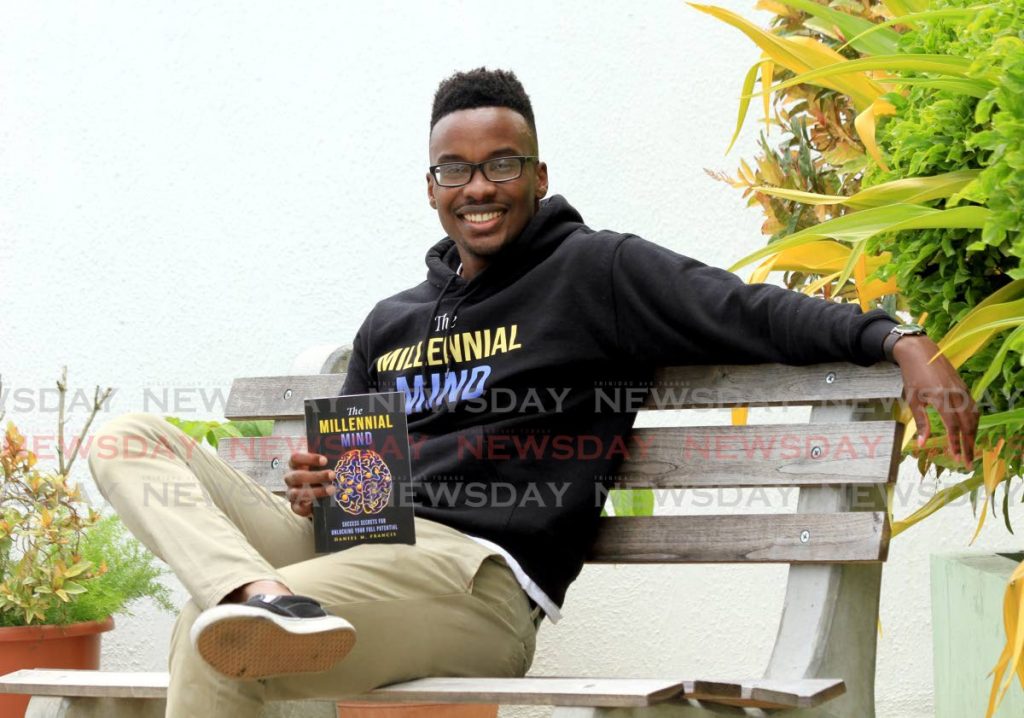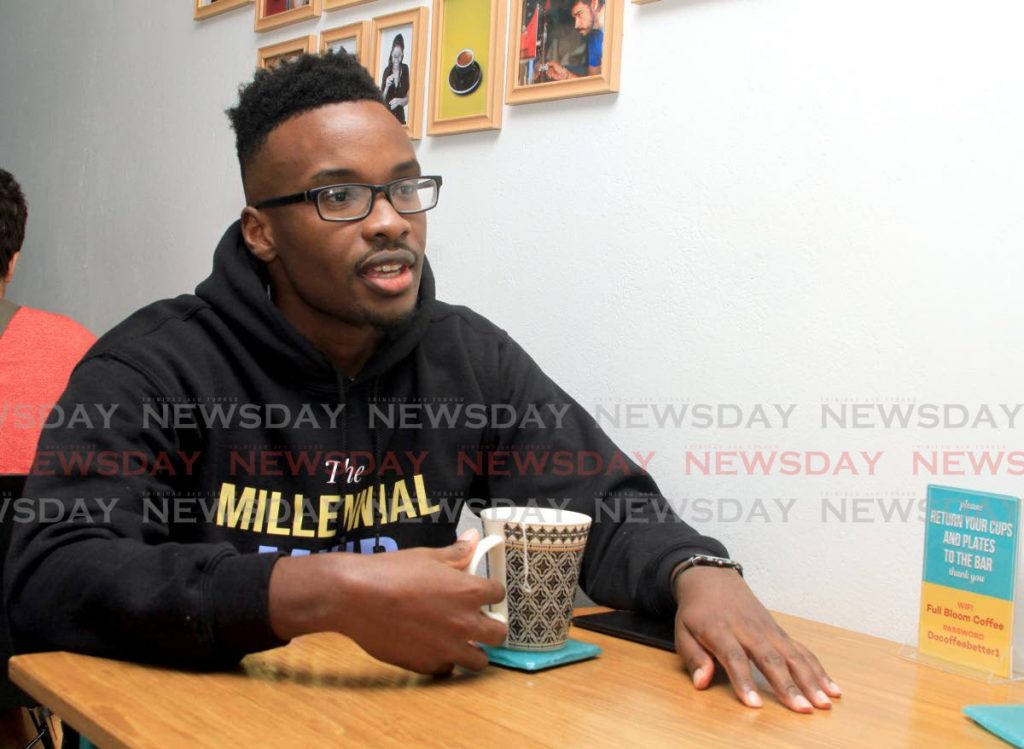Inside the Millennial Mind

DANIEL FRANCIS was going to be a doctor. The 29-year-old Fatima old boy was considered “bright,” and filtered into the sciences classes, streamlined to practise medicine.
A taste of liberal arts and social justice in university changed his perspective, turning him into an author, life coach and event organiser.
Francis is a millennial. Like many of his generation, he was raised by parents who wanted to prepare him for a world that no longer exists; worked in a job that embraced conventional values such as punctuality at work; and went through a schooling system that instilled the value of pushing oneself, sometimes to one’s detriment, to perform.
Francis wrote The Millennial Mind: Unlocking Your Full Potential, a book dedicated to helping millennials find their path in life, and inadvertently explaining the mysterious millennials to baby boomers and Gen-Xers who may not have a clue how to understand this first wave of digital natives.
His book is targeted to younger and middle millennials, people 24-35. Elder millennials, people 35-39, he said, tend to be pretty settled in life.
“Not all millennials are in the same stage of life. We must differentiate and stop making broad statements. Even the ones who are elder, they still have their issues.”
Elder millennials, he said, tend to have achieved what they’ve wanted and need to figure out what comes next.
Each chapter of The Millennial Mind starts with a story, highlights a problem, he gives solutions and there’s a self-reflective exercise at the end.
“When I sat down and wrote this book, my main goal was to get the reader to do some much-needed introspection. When they read it, they need to think hard about what decisions they are making right now, why they are making it and where did it come from because millennials, we get distracted.”
Chapter one is about parents, their expectations of their children and their desire to give their children what they never had growing up.
“For my parents, they wanted to study abroad. They weren’t able to do that and they wanted their child to experience whatever it is that they could not experience.”
He did SATs and got into Loyola University, a Jesuit-run liberal arts school in New Orleans, to do pre-med. Though he wanted to be a doctor, he minored in Latin American studies and realised his dreams of being a doctor were not his, but others' desires projected onto him.
“I remember going through the whole denial of wanting to be a doctor and working at a bank (after university) and hating it. It just was not fitting for me. I felt miserable. I saw people in different stages of their life also be miserable.”

One of his co-workers was close to retiring. She had only planned on working at the bank for a few years, but life’s responsibilities such as loan payments and children grew, and she settled for bank work. Francis did not want that for himself.
“They were miserable. That showed me I got to do what I’m passionate about. So what if I’m broke? At least I’m satisfied. That’s a real millennial thing: choose passion and purpose, mission and vision over money."
His parents did not want him to quit his job. But he knew if he was passionate about his work and loved what he did he would put “an extraordinary” amount of time and effort into it.
“People have this weird misconception that if you don’t do a regular job, you’re living a risky life, Even with a regular job it is still a risky life. Nothing is guaranteed.”
Francis knew no matter what he did in life, he had to have fun. Public speaking and inspiring people to find their true passions were his idea of fun.
“People find it weird when they DM (direct message) me and ask to do a seminar and I say, ‘Yeah, that sounds like fun.’ They question it. If it wasn’t fun, I would not want to do it.”
Being childlike – not childish – but embracing happiness, joy and playfulness is how he believes life should be.
“If you’re always serious, that’s just exhausting.”
Okay Boomers
Boomers, Francis said, come from the generation of "hard work pays off." Millennials would rather work smart to get the same result.
“While we understand that they (boomers) have been doing this a long time and have experience, they are strict.”
Baby boomers, he said, must understand millennials bring new knowledge of technology which could potentially improve and upgrade their business, but if millennials are shut out of the decision-making process, efficient change will not happen.
Workplaces that have traditional values such as penalising people for being one minute late back from lunch, having issues with staff checking their phones or making employees drive to work and spend money on food, when one could do the same work from the comfort of home, seems like madness to some millennials.
“We question these things and we ask what is the purpose? The answer we get is, 'This is how we’ve done it, so this is how we will continue to do it. We come from the generation of, "Yeah, we must work hard.'"
"But we know working hard is not going to guarantee the results. We understand working smart.”
Refusal to change is how companies die, Francis said. Many companies fought remote work and flexi-time, yet with covid19, suddenly, the things millennials were told were not possible became possible.
“It's funny that the infrastructure for work from home and the need to build a digital footprint for all these businesses was so taboo before covid19, but suddenly you see people working from home. Millennials have been saying this for years. We have been silenced for our ideas because of tradition.”
Millennials and boomers must find common ground.
“The older generation have to accept our ideas, or nothing is going to change. It can’t just be us bringing our ideas and being told: ‘Small man – no.’ We will be turned off from the entire experience.”
When millennials care about their work, they want to make a meaningful contribution.
“I see it all the time in organisations. People have no way to move up, they don’t see any way for them to be actually heard and a job just becomes that. They hate every minute of it and any opportunity they have to move out, they will, and the company wonders why there is such a high turnover.”
It is no longer good enough to just train millennials for a job. Francis said millennials must be trained for life. Time management, work-life balance, preparing for the future are all skills millennials still need to be trained in.
“Yeah, the eight hours you spend in your life is important, but all the other hours, that time is important too because they (workers) will be bringing that to work. Companies just want that short-term gains so much that they can’t see what they are expecting of us is only going to give short-term rewards.”
Another chapter in his book is called the Push-Pull Factor, a section dedicated to how millennials have been pushed through the education system.
“We are just pushed to do things. Assignments, lessons, exams, CXC, that’s all we know. To this day, CAPE was the hardest and most debilitating experience.”
He did two years of pure maths in one year.
“That was the first year of my life I had hives because of stress. We are conditioned to only react to these push-pull factors.”
When millennials get out to work, they react when pushed.
“We need a job, we find a job, we get the job, the job is pushing us to do more work we will be pushing – and that makes us react and change jobs. The pull should be what we are doing to say, 'How do I want my life to be? What am I aiming for? Is my bigger picture what are the things that I actually want?'”
He encourages people to write down their goals and set intentions.
“We think that we do not have the control, that nothing we can do to put out the control of what happens to us.”
Millennials survive and thrive on social media, but it is also distracting and toxic if not managed.
“It’s easy for us to feel bored or feel unhappy about our lives and to just revert to our phones, revert to scrolling our endless timelines of our different social media platforms. That’s mindless and distracting.”
Twitter scares him.
“I think Twitter is the most toxic thing in the world. It can go from normal and random things to attacking someone’s character is trending. Or something super-negative, and I wonder, why is this a thing we are focusing on?”
Positive things could come from social media, but it depends on the people, environment and metrics, because negative trends more than the positive.
Francis is a personal development coach and motivational speaker at his parents’ company Rebit Ltd. He just registered his own company, where he will be doing his own thing, mostly with millennials.
Unit Trust Corporation (UTC) is one of its clients and sponsored his virtual book launch. The launch was supposed to be at Fatima College, but because of lockdown, he held it on Instagram live. He rented a studio, Nailah Blackman and Groovy Soca Monarch winner Jessie “College Boy Jessie” Stewart performed. He had 2,500 virtual guests and has sold more than 700 books.


Comments
"Inside the Millennial Mind"